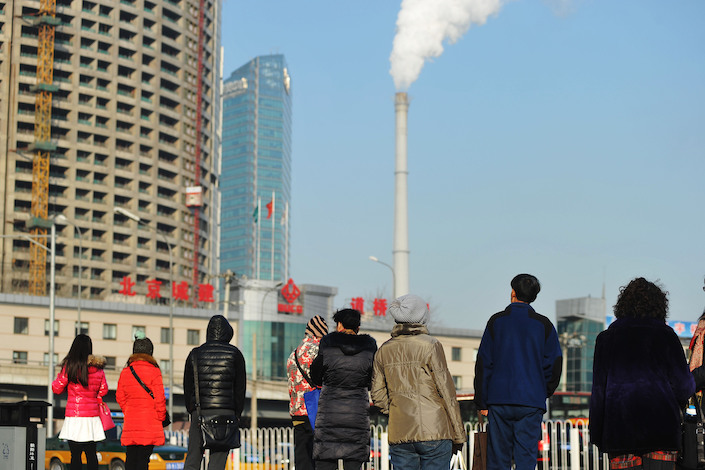Trust Companies Tap Green Finance Amid China’s Carbon Neutrality Push

China’s trust companies are stepping up a foray into investments backed by emission reduction projects as the world’s largest greenhouse gas emitting country encourages financial institutions to tap green finance in the nation’s fight against climate change.
Earlier this month, State Grid International Leasing Co. Ltd., a unit of China’s largest utility, raised 1.75 billion yuan ($270 million) via commercial paper to support renewable energy-related financial leasing projects. The bills, the country’s first asset-backed securities with carbon neutrality projects as underlying assets, are managed by Yingda International Trust Co. Ltd., also a subsidiary of State Grid.
In February, AVIC Trust Co. Ltd. set up a 50 million yuan trust plan in partnership with the China Energy Conservation Association and Shanghai Treasure Carbon to invest in assets that can be traded in the national carbon market. Other trust companies including China Industrial International Trust Ltd. also set up trust plans backed by carbon reduction-related projects.
The trust companies are marching into green finance as the central government’s push toward carbon neutrality creates new investment opportunities. China is already the world's largest green financial market.
Read more
Cover Story: The Green Finance Challenge Facing China’s Banks
China’s top leadership set ambitious goals to address climate change. President Xi Jinping pledged in September that the world’s biggest producer of carbon dioxide — the chief greenhouse gas contributing to global warming — aims to top out such emissions before 2030 and achieve carbon neutrality by 2060. The target will require the transformation of the world’s second-largest economy.
To reach the goals, China will need to invest $16 trillion in new energy and pollution control-related projects over the next 20 years with backing from both the state and private sector, according to Goldman Sachs.
China’s national carbon-trading market officially opened Jan. 1, involving the first batch of 2,225 domestic thermal power generators.
By the end of 2020, the country had outstanding green loans of nearly 12 trillion yuan ($1.85 trillion), ranking first in the world. The outstanding value of green bonds was 813.2 billion yuan, the second-most in the world.
In early March, four of China’s five biggest state-owned electricity utilities borrowed a total of 9 billion yuan via carbon-neutral bond issuances to fund development of renewables facilities. That followed 6.4 billion yuan carbon-neutral bonds issued by six state-owned utilities and infrastructure companies in February, marking the nation’s first batch of carbon-neutral bonds. The bonds were highly sought by investors such as insurers, banks, wealth management firms, funds and securities companies, industry experts said.
Achieving carbon neutrality will require tens of billions of yuan of green investment, most of which will require mobilizing social capital through the financial system, bringing huge opportunities for green financing, a central bank official said. The central bank is crafting a package of policies to support finance for green development.
But there are also concerns that the growing enthusiasm may brew market bubbles. Axel Weber, chairman of UBS Group, said insufficient supply of high-quality assets and a lack of clear standards may create room for hyped and speculative investments.
Contact reporter Han Wei (weihan@caixin.com) and editor Bob Simison (bobsimison@caixin.com).
Download our app to receive breaking news alerts and read the news on the go.
Follow the Chinese markets in real time with Caixin Global’s new stock database.







